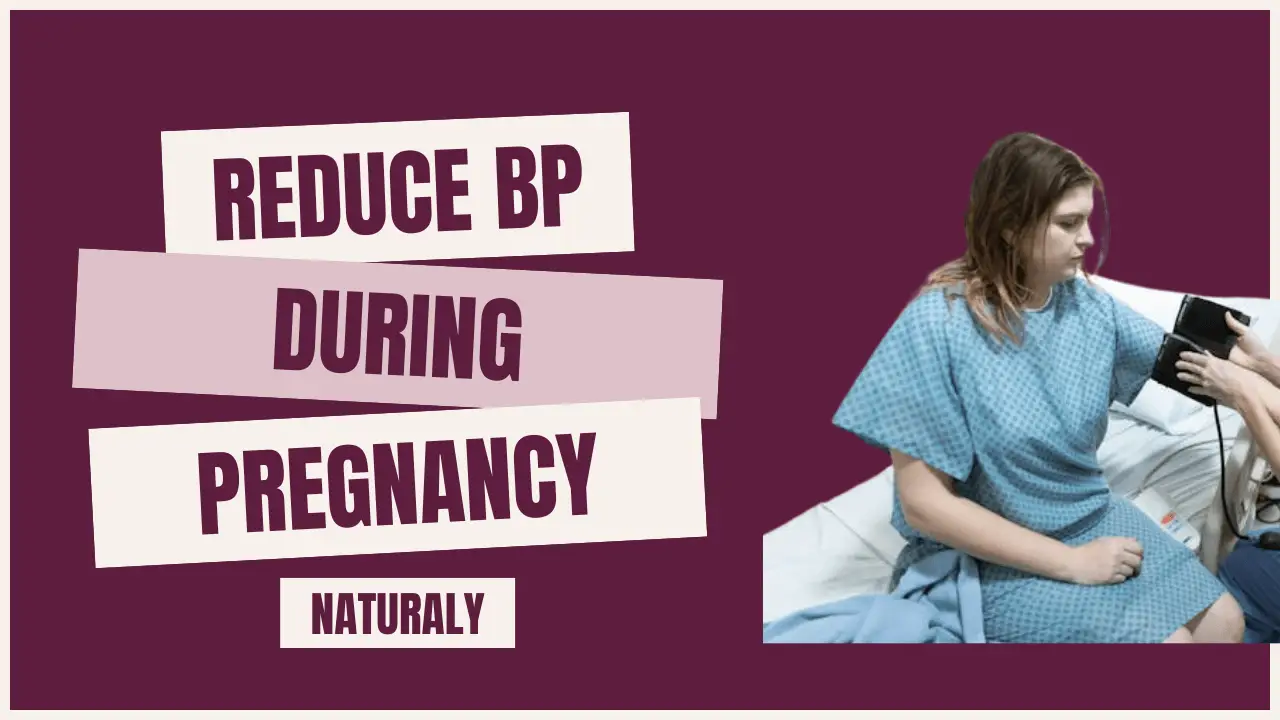It’s critical to control blood pressure throughout pregnancy for the benefit of the fetus as well as the mother. Many expecting mothers look for non-pharmaceutical, safe means of preserving normal blood pressure levels.
We look at ten tried-and-true methods in this guide for naturally lowering blood pressure during pregnancy. These techniques include dietary modifications, lifestyle alterations, and holistic approaches that support general health during this critical period.
Expectant moms can naturally control their blood pressure and have a healthier pregnancy experience by being aware of these natural methods and implementing them into everyday routines.
Maintain a Balanced Diet:
A balanced diet plays a pivotal role in managing blood pressure naturally during pregnancy. Opting for nutrient-dense foods not only supports the growing baby but also helps regulate blood pressure levels effectively.
How to Reduce BP During Pregnancy Naturally: Nutrient-Rich Choices
Consuming foods high in potassium, magnesium, and calcium can help regulate blood pressure during pregnancy. Potassium lowers blood pressure by assisting the body in balancing the amounts of sodium.
Good sources of potassium include spinach, sweet potatoes, bananas, and yogurt. Nuts, whole grains, and leafy greens are good sources of magnesium, which relaxes blood vessels to improve circulation and decrease blood pressure.

Foods high in calcium, such as broccoli, dairy products, and fortified cereals, support healthy blood vessels and blood pressure control.
Balancing Macronutrients
It’s critical to maintain a balance of macronutrients, such as proteins, carbs, and healthy fats, in addition to micronutrients. Choose complex carbs, such as those found in whole grains and legumes, as they offer long-lasting energy without spiking blood sugar.
Fish, poultry, and tofu are examples of lean proteins that promote the formation of muscle and tissue without adding a lot of saturated fat. Including foods high in heart-healthy fats, such as nuts, avocados, and olive oil, aids in the absorption of important fat-soluble vitamins.
Expectant mothers can effectively manage their blood pressure naturally during pregnancy and ensure optimal health for themselves and their unborn children by prioritizing a diversified and balanced diet rich in essential nutrients.
Stay Hydrated:
Staying adequately hydrated is crucial for managing blood pressure naturally during pregnancy. Water plays a vital role in regulating blood volume and ensuring proper circulation, which is essential for maintaining healthy blood pressure levels.
How to Reduce BP During Pregnancy Naturally: Importance of Hydration
During pregnancy, the body’s blood volume increases to support the developing fetus. Adequate hydration helps maintain this increased blood volume, preventing dehydration-related spikes in blood pressure. Dehydration can lead to higher blood viscosity, making it harder for the heart to pump blood effectively, thus potentially raising blood pressure.
Tips for Hydration
Water consumption during pregnancy is recommended to be maintained at eight to ten glasses per day. Drinks infused with fruit or herbal teas can also help you stay hydrated and provide you with extra nutrients.
Fluids without caffeine are preferred to minimize any possible effects on blood pressure management. pee color can be used as a simple indicator of proper hydration; pale yellow pee suggests adequate intake of water.
Expectant moms can effectively support their natural blood pressure management throughout pregnancy by making drinking plenty of water a priority in their daily routine. This will promote the health of both the mother and the fetus.
Regular Exercise:
Engaging in regular exercise is beneficial for managing blood pressure naturally during pregnancy. Safe physical activity helps improve circulation, strengthen the heart, and maintain overall cardiovascular health, all of which contribute to keeping blood pressure levels in check.
How to Reduce BP During Pregnancy Naturally: Safe Exercise Practices
Moderate-intensity exercises such as brisk walking, swimming, and prenatal yoga are generally safe and effective for pregnant women. These activities help increase heart rate and promote blood flow without placing excessive strain on the body. Regular exercise also helps reduce stress levels, which can further aid in lowering blood pressure.
Tips for Safe Exercise
It’s essential to consult with a healthcare provider before starting or continuing any exercise routine during pregnancy. Aim for at least 150 minutes of moderate-intensity exercise per week, spread across several days.
Listen to your body and avoid activities that involve high impact or risk of falls. Stay hydrated and wear comfortable, supportive clothing while exercising.

By incorporating safe and regular exercise into your pregnancy routine, you can support natural blood pressure management, promoting a healthier pregnancy for both you and your baby.
Reduce Sodium Intake:
Limiting sodium intake is crucial for managing blood pressure naturally during pregnancy. High levels of sodium can cause fluid retention, which increases blood volume and raises blood pressure.
How to Reduce BP During Pregnancy Naturally: Tips for Lowering Sodium Intake
During pregnancy, it’s recommended to consume no more than 2,300 milligrams of sodium per day. Avoiding processed and packaged foods, which are often high in sodium, is essential. Opt for fresh fruits and vegetables, lean proteins, and whole grains, which naturally contain lower levels of sodium. When cooking at home, use herbs, spices, and lemon juice to enhance flavor instead of salt.
Benefits of Low Sodium Diet
A low-sodium diet helps maintain fluid balance in the body, reducing the strain on the heart and blood vessels. This can prevent or alleviate hypertension during pregnancy, promoting better maternal and fetal health outcomes.
By consciously reducing sodium intake through dietary choices, expectant mothers can effectively support natural blood pressure management, contributing to a healthier pregnancy journey.
Manage Stress:
Effective stress management is crucial for naturally reducing blood pressure during pregnancy. High-stress levels can elevate blood pressure temporarily and, if chronic, contribute to long-term hypertension.
How to Reduce BP During Pregnancy Naturally: Techniques for Stress Management
Pregnant women can manage stress through various relaxation techniques such as deep breathing exercises, meditation, and prenatal yoga. These practices help calm the mind and body, reducing the production of stress hormones like cortisol that can impact blood pressure.
Benefits of Stress Reduction
By reducing stress, expectant mothers can promote better overall cardiovascular health. Lower stress levels contribute to improved blood flow, reduced muscle tension, and a more stable heart rate, all of which help maintain healthy blood pressure levels throughout pregnancy.
Incorporating Relaxation into Daily Routine
It’s important to prioritize self-care and set aside time for activities that promote relaxation. Whether it’s taking short breaks, enjoying a warm bath, or engaging in hobbies, finding ways to unwind can significantly benefit both maternal and fetal well-being.
By integrating stress management techniques into daily life, pregnant women can support natural blood pressure management, ensuring a healthier pregnancy experience.
Get Adequate Sleep:
Adequate sleep is essential for managing blood pressure naturally during pregnancy. Sleep deprivation or poor sleep quality can lead to increased stress levels and hormonal imbalances that may contribute to elevated blood pressure.
How to Reduce BP During Pregnancy Naturally: Importance of Adequate Sleep
During pregnancy, the body undergoes physiological changes that can affect sleep patterns. It’s important for expectant mothers to prioritize good sleep hygiene, including establishing a consistent bedtime routine and creating a comfortable sleep environment. Strive for 7-9 hours of uninterrupted sleep each night to maintain overall health and well-being.
Benefits of Quality Sleep
Quality sleep promotes proper hormone regulation, including hormones that affect blood pressure. Restful sleep allows the body to repair and rejuvenate, supporting cardiovascular health and reducing the risk of hypertension during pregnancy.
Tips for Better Sleep
Practice relaxation techniques before bed, such as gentle stretching or deep breathing exercises. Limit caffeine intake and avoid heavy meals close to bedtime. Maintain a comfortable sleep environment with adequate room temperature and minimal distractions.
By prioritizing adequate and quality sleep, expectant mothers can naturally support healthy blood pressure levels during pregnancy, contributing to a smoother and healthier pregnancy journey.
Monitor Your Blood Pressure Regularly:
Regular monitoring of blood pressure is essential for managing and reducing blood pressure naturally during pregnancy. Monitoring allows expectant mothers to track changes and take proactive steps to maintain healthy blood pressure levels.
How to Reduce BP During Pregnancy Naturally: Importance of Regular Monitoring
During pregnancy, blood pressure can fluctuate due to hormonal changes and increased blood volume. Monitoring helps identify any abnormal readings early, allowing for timely intervention and management. This proactive approach reduces the risk of complications associated with hypertension during pregnancy.
Methods of Monitoring
Expectant mothers can monitor blood pressure at home using a reliable blood pressure monitor recommended by their healthcare provider. It’s important to follow the recommended schedule for monitoring and keep a record of readings to share with healthcare professionals during prenatal visits.
Benefits of Regular Monitoring
Regular monitoring empowers pregnant women to actively participate in their healthcare management. It promotes awareness of blood pressure trends and enables informed decisions regarding diet, exercise, and stress management strategies aimed at maintaining optimal blood pressure levels naturally.
By incorporating regular blood pressure monitoring into their routine, expectant mothers can effectively support natural blood pressure management during pregnancy, ensuring a healthier maternal and fetal outcome.
Avoid Caffeine and Alcohol:
Avoiding caffeine and alcohol is crucial for managing blood pressure naturally during pregnancy. Both substances can affect blood pressure levels and pose potential risks to fetal development.
How to Reduce BP During Pregnancy Naturally: Impact of Caffeine and Alcohol
Caffeine is a stimulant that can temporarily increase blood pressure by stimulating the nervous system and constricting blood vessels. It’s found in coffee, tea, energy drinks, and some sodas. Pregnant women are advised to limit caffeine intake or switch to decaffeinated alternatives.
Alcohol consumption during pregnancy is associated with various complications, including high blood pressure. It can also affect fetal growth and development. It’s recommended to abstain from alcohol entirely during pregnancy to minimize risks to both mother and baby.
Benefits of Avoidance
By avoiding caffeine and alcohol, expectant mothers reduce the likelihood of blood pressure spikes and support overall cardiovascular health. This decision also promotes a safer environment for fetal development and reduces the risk of related pregnancy complications.
Tips for Substituting
Opt for caffeine-free herbal teas or fruit-infused water as refreshing alternatives to caffeinated beverages. If social situations involve alcohol, choose non-alcoholic options or mocktails to enjoy without compromising health.
By prioritizing avoidance of caffeine and alcohol, pregnant women can effectively support natural blood pressure management during pregnancy, promoting a healthier maternal and fetal outcome.
Incorporate Herbal Remedies:
Some herbal remedies can potentially help in managing blood pressure naturally during pregnancy. It’s important to consult with a healthcare provider before using any herbal remedies to ensure safety and efficacy.
How to Reduce BP During Pregnancy Naturally: Safe Herbal Choices
Certain herbs, when used under guidance, may support blood pressure regulation. For example, hawthorn berry is believed to dilate blood vessels, improving blood flow and lowering blood pressure. However, its safety during pregnancy requires careful consideration and medical advice.
Caution and Guidance
Pregnant women should exercise caution with herbal remedies due to potential interactions with medications and varying levels of scientific evidence supporting their efficacy. Some herbs traditionally used for blood pressure management include garlic, ginger, and dandelion.
Benefits of Herbal Remedies
When used appropriately, herbal remedies can complement a healthy diet and lifestyle, contributing to natural blood pressure management. They may offer additional nutrients and compounds that support cardiovascular health, though their effectiveness varies among individuals.
By incorporating herbal remedies cautiously and with professional guidance, expectant mothers can explore natural options for supporting blood pressure management during pregnancy, promoting overall well-being for themselves and their babies.
Stay Informed and Consult Your Doctor:
Staying informed and regularly consulting with your healthcare provider is crucial for effectively managing blood pressure naturally during pregnancy. Your doctor can provide personalized guidance and monitor your health to ensure the best outcomes for you and your baby.
How to Reduce BP During Pregnancy Naturally: Importance of Medical Guidance
Pregnancy is a unique time when individual health needs vary. Your doctor can offer tailored advice on diet, exercise, and lifestyle adjustments that support natural blood pressure management. They can also monitor your blood pressure levels throughout pregnancy and adjust treatment plans as needed.
Benefits of Medical Consultation
Regular prenatal visits allow your doctor to detect any changes in blood pressure early and intervene promptly if necessary. This proactive approach reduces the risk of complications associated with hypertension during pregnancy, such as preeclampsia.
Empowering Decision-Making
By staying informed about your health and maintaining open communication with your doctor, you empower yourself to make informed decisions about managing your blood pressure naturally. Your doctor’s expertise ensures that you receive the most accurate information and support throughout your pregnancy journey.
Conclusion:
In conclusion, managing blood pressure naturally during pregnancy is achievable through simple yet effective lifestyle adjustments. By incorporating a balanced diet, regular exercise, stress management techniques, and adequate sleep, expectant mothers can promote optimal cardiovascular health.
It’s also crucial to monitor blood pressure regularly and consult healthcare providers for personalized guidance. Together, these steps empower women to navigate their pregnancy journey with confidence, knowing they are actively supporting their well-being and that of their baby by adopting strategies on how to reduce BP during pregnancy naturally. Click to learn more.
FAQs:
1: Can I exercise during pregnancy to help manage my blood pressure naturally?
- Yes, moderate-intensity exercises like walking, swimming, and prenatal yoga can improve circulation and support healthy blood pressure levels.
2: Are there specific foods that can help lower blood pressure during pregnancy?
- Yes, foods rich in potassium (e.g., bananas, sweet potatoes), magnesium (e.g., nuts, whole grains), and calcium (e.g., dairy, leafy greens) can aid in blood pressure regulation.
3: How much water should I drink daily to maintain healthy blood pressure during pregnancy?
- Aim for at least eight to ten glasses of water per day to stay hydrated and support blood volume regulation.
4: Are herbal remedies safe for managing blood pressure during pregnancy?
- Some herbs like hawthorn berry may help but always consult with your healthcare provider before using herbal remedies during pregnancy.
5: Is it safe to reduce sodium intake during pregnancy?
- Yes, lowering sodium intake by avoiding processed foods and seasoning with herbs instead of salt can help manage blood pressure safely.
